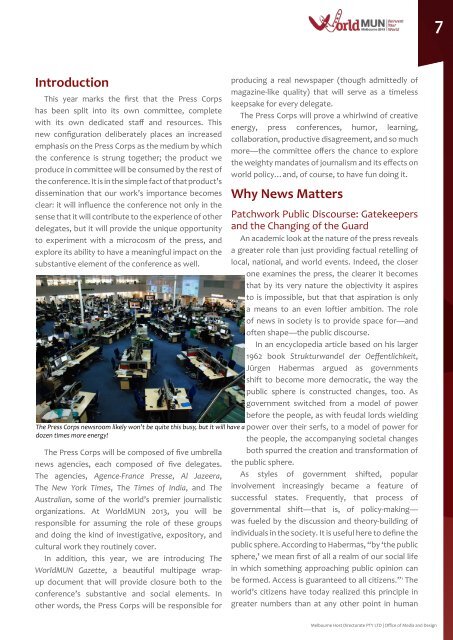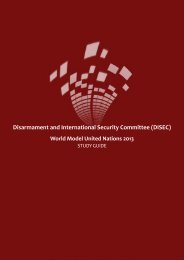Press Corps - World Model United Nations
Press Corps - World Model United Nations
Press Corps - World Model United Nations
You also want an ePaper? Increase the reach of your titles
YUMPU automatically turns print PDFs into web optimized ePapers that Google loves.
Introduction<br />
This year marks the first that the <strong>Press</strong> <strong>Corps</strong><br />
has been split into its own committee, complete<br />
with its own dedicated staff and resources. This<br />
new configuration deliberately places an increased<br />
emphasis on the <strong>Press</strong> <strong>Corps</strong> as the medium by which<br />
the conference is strung together; the product we<br />
produce in committee will be consumed by the rest of<br />
the conference. It is in the simple fact of that product’s<br />
dissemination that our work’s importance becomes<br />
clear: it will influence the conference not only in the<br />
sense that it will contribute to the experience of other<br />
delegates, but it will provide the unique opportunity<br />
to experiment with a microcosm of the press, and<br />
explore its ability to have a meaningful impact on the<br />
substantive element of the conference as well.<br />
The <strong>Press</strong> <strong>Corps</strong> newsroom likely won’t be quite this busy, but it will have a<br />
dozen times more energy!<br />
The <strong>Press</strong> <strong>Corps</strong> will be composed of five umbrella<br />
news agencies, each composed of five delegates.<br />
the agencies, Agence-France <strong>Press</strong>e, Al Jazeera,<br />
the New York Times, the Times of India, and The<br />
Australian, some of the world’s premier journalistic<br />
organizations. At <strong>World</strong>MUN 2013, you will be<br />
responsible for assuming the role of these groups<br />
and doing the kind of investigative, expository, and<br />
cultural work they routinely cover.<br />
in addition, this year, we are introducing The<br />
<strong>World</strong>MUN Gazette, a beautiful multipage wrapup<br />
document that will provide closure both to the<br />
conference’s substantive and social elements. In<br />
other words, the <strong>Press</strong> <strong>Corps</strong> will be responsible for<br />
producing a real newspaper (though admittedly of<br />
magazine-like quality) that will serve as a timeless<br />
keepsake for every delegate.<br />
The <strong>Press</strong> <strong>Corps</strong> will prove a whirlwind of creative<br />
energy, press conferences, humor, learning,<br />
collaboration, productive disagreement, and so much<br />
more—the committee offers the chance to explore<br />
the weighty mandates of journalism and its effects on<br />
world policy…and, of course, to have fun doing it.<br />
Why News Matters<br />
Patchwork Public Discourse: Gatekeepers<br />
and the Changing of the Guard<br />
An academic look at the nature of the press reveals<br />
a greater role than just providing factual retelling of<br />
local, national, and world events. Indeed, the closer<br />
one examines the press, the clearer it becomes<br />
that by its very nature the objectivity it aspires<br />
to is impossible, but that that aspiration is only<br />
a means to an even loftier ambition. The role<br />
of news in society is to provide space for—and<br />
often shape—the public discourse.<br />
In an encyclopedia article based on his larger<br />
1962 book Strukturwandel der Oeffentlichkeit,<br />
Jürgen Habermas argued as governments<br />
shift to become more democratic, the way the<br />
public sphere is constructed changes, too. As<br />
government switched from a model of power<br />
before the people, as with feudal lords wielding<br />
power over their serfs, to a model of power for<br />
the people, the accompanying societal changes<br />
both spurred the creation and transformation of<br />
the public sphere.<br />
As styles of government shifted, popular<br />
involvement increasingly became a feature of<br />
successful states. Frequently, that process of<br />
governmental shift—that is, of policy-making—<br />
was fueled by the discussion and theory-building of<br />
individuals in the society. It is useful here to define the<br />
public sphere. According to Habermas, “by ‘the public<br />
sphere,’ we mean first of all a realm of our social life<br />
in which something approaching public opinion can<br />
be formed. Access is guaranteed to all citizens.” 1 the<br />
world’s citizens have today realized this principle in<br />
greater numbers than at any other point in human<br />
Melbourne Host Directorate PTY LTD | Office of Media and Design<br />
7
















